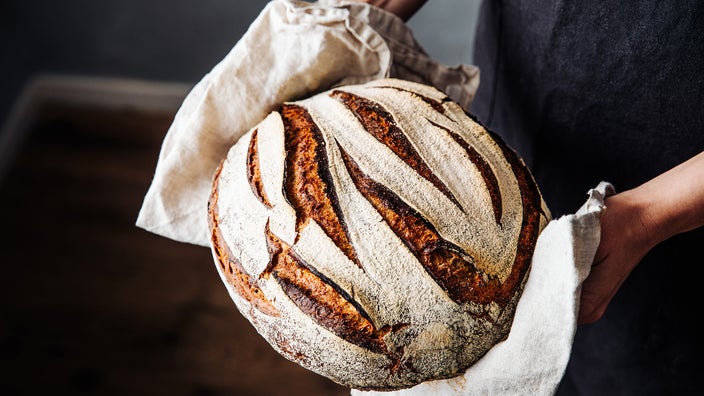
Is Sourdough Bread Good for You? Here Are 5 Health Benefits of Sourdough Bread
Key takeaways:
Sourdough bread is made using a traditional fermentation process. This process involves a sourdough starter, which gives the bread some beneficial nutrients.
Compared to commercial white bread, sourdough bread is easier to digest. But people with a gluten sensitivity or intolerance should consider other options.
Sourdough bread has a lower glycemic index than white bread, making it a better choice for people with diabetes.

Many people love the unique taste and texture of sourdough bread. And lots also enjoy using a sourdough starter to make their own at home. But is sourdough bread good for you and worth the hype? Turns out that the traditional fermentation process used to make sourdough gives it some distinct health benefits.
What is sourdough?
Sourdough bread is made from flour and water that’s fermented using a “starter,” or a live culture fermented by bacteria and yeast. It’s added to flour and water to begin the fermentation process and gives the bread a mildly sour taste.
The idea of leavening bread with bacteria and yeast dates as far back as 3,000 BC. Making bread this way produces loaves with better texture, flavor, and nutritional content compared to many commercial bread varieties.
Daily carb counts: Carbohydrates are a key part of a nutritious diet. But how many carbs do you really need a day?
Carbs and blood sugar: There are different types of carbs, and how they affect your blood sugar varies.
A holistic view of whole grains: A registered dietitian breaks down the nutritional content of different whole grains and shares tips on how to work them into your diet.
Health benefits of sourdough bread
Due to its fermentation process, sourdough has some unique health benefits compared to commercial bread. Here are five sourdough bread benefits:
Digestion: The fermentation process for sourdough bread can lower the amount of nondigestible carbohydrates in the wheat. This can make the bread easier to digest for people, including those with irritable bowel syndrome (IBS).
Lower glycemic index: Sourdough bread has a lower glycemic index (54) than commercial bread (71). That means sourdough bread doesn’t raise blood sugar levels as rapidly as refined white bread.
Healthy bacteria: Sourdough starter naturally contains prebiotic and probiotic bacteria. Although the heat from baking mostly destroys the probiotics, the prebiotics remain. These nutrients support your gut health.
Nutritional value: Whole-grain breads naturally contain calcium, iron, and zinc. But bread also contains phytates, which block absorption of these minerals. Sourdough bread’s fermentation process helps break down phytates, so the minerals in the bread are easier for the body to absorb.
Fewer preservatives: Unlike with commercial bread, sourdough baking reduces the need for preservatives because the fermentation process creates acetate in the bread. This helps naturally increase the shelf life of the bread.
Is it healthy to eat sourdough bread daily?
You can enjoy sourdough bread daily as part of a healthy diet. One food doesn’t make or break a diet — it’s the whole dietary pattern that matters. A well-balanced approach to eating focuses on:
Vegetables
Fruit
Protein-rich foods
Save every month on GLP-1 meds with GoodRx
Save an average of $235 on FDA-approved GLP-1s like Ozempic and Zepbound.

Is sourdough healthier than other types of bread?
Sourdough may be healthier than some types of bread. But it depends on what health benefits you’re looking for and what types of bread you’re comparing it to.
Calories | 90.1 | 80.6 | 79.8 |
Sugars | 0 | 1.39 g | 1.7 g |
54 | 71 | 71 | |
Carbs | 19 g | 13.7 g | 14.8 g |
Fiber | 1.01 g | 1.92 g | 0.81 g |
*Information from the USDA’s FoodData Central for 1 slice of bread.
When it comes to sourdough versus white bread, sourdough has more health benefits. Commercial white bread contains preservatives and is considered an ultra-processed food.
But what if you compare sourdough to whole-wheat bread? Sourdough bread is easier to digest, but whole-wheat bread has more fiber. Those are both important benefits to consider.
Sprouted whole-grain bread may be healthier than sourdough bread that’s made with white flour. The process of sprouting whole grains results in flour that’s easier to digest. And, similar to whole-wheat bread, sprouted-grain bread is a good source of whole grains, fiber, and other nutrients.
Does sourdough have gluten?
Sourdough breads can be made from any type of flour, but the most common is wheat flour, which does contain gluten. As a result, it’s not suitable for people with celiac disease or gluten intolerance.
Gluten-free sourdough bread is available and can be made with flour from:
Rice
Corn
Sorghum
Millet
Tapioca
Quinoa
Read more like this
Explore these related articles, suggested for readers like you.
Is sourdough bread good for people with diabetes?
People with diabetes can eat sourdough bread or any other bread that fits into their dietary plan. That said, because sourdough bread has a lower glycemic index than other bread varieties, it can be a particularly good choice if you’re watching your blood sugar levels. If you have diabetes, you can work with a dietitian to learn about the right amount of carbs to include in your meals and snacks.
Remember, people don’t usually eat bread alone. So, when you’re eating bread, the glycemic load of the whole meal needs to be considered. Spreads and sandwich ingredients — like vegetables, dairy, and other proteins — help keep blood sugar levels more stable.
Who should not eat sourdough bread?
Apart from those with a gluten sensitivity or wheat allergy, people who take monoamine oxidase inhibitors (MAOIs) for depression should limit how much sourdough they have. This is because sourdough bread has yeast, which naturally contains the amino acid tyramine. And a high tyramine intake can cause a spike in blood pressure for people taking MAOIs.
The bottom line
Sourdough bread’s lower glycemic index, higher nutrient profile, and easier digestibility make it a better option compared to commercial white bread for many people. However, depending on your health goals and any health conditions you have, other bread varieties may be an even better option. In any case, make sure to eat a variety of fruits and vegetables, along with healthy fats and proteins for a balanced diet.
Why trust our experts?



References
American Association of Psychiatric Pharmacists. (n.d.). Monoamine oxidase inhibitors (MAOI): Significant drug-drug/drug-food Interactions with MAOIs.
Capurso, A., et al. (2020). The Mediterranean way: Why elderly people should eat wholewheat sourdough bread — A little known component of the Mediterranean diet and healthy food for elderly adults. Aging Clinical and Experimental Research.
FoodData Central. (2019). Bread, white, commercially prepared (includes soft bread crumbs). U.S. Department of Agriculture.
FoodData Central. (2019). Bread, whole-wheat, commercially prepared. U.S. Department of Agriculture.
FoodData Central. (2023). Sourdough. U.S. Department of Agriculture.
Gobbetti, M., et al. (2014). How the sourdough may affect the functional features of leavened baked goods. Food Microbiology.
Kim, J. S., et al. (2019). Effect of nutrient composition in a mixed meal on the postprandial glycemic response in healthy people: A preliminary study. Nutrition Research and Practice.
Lau, S. W., et al. (2021). Sourdough microbiome comparison and benefits. Microorganisms.
Naumenko, N., et al. (2021). The influence of the use of whole grain flour from sprouted wheat grain on the rheological and microstructural properties of dough and bread. International Journal of Food Science.
Quattrini, M., et al. (2019). Exploiting synergies of sourdough and antifungal organic acids to delay fungal spoilage of bread. International Journal of Food Microbiology.
ScienceDirect. (n.d.). Sourdough.
ScienceDirect. (n.d.). Sourdough bread.





























